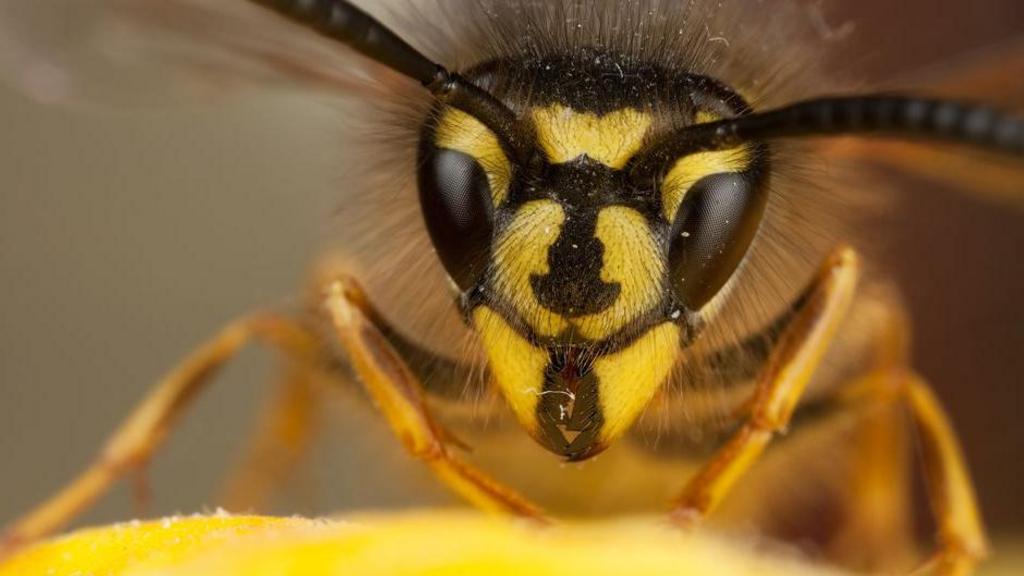John Horsley, a member of the British Pest Control Association, experienced firsthand the nuisance these insects can cause when a wasp crawled down his shirt while he was gardening.
“That stung me a few times in the back,” he recounted. “It wasn’t a pleasant experience.”
Horsley is well aware of the problems wasps can create, from disrupting outdoor gatherings to building troublesome nests.
Following a recent dip in wasp-related service calls, his industry has seen a surge in activity this year, addressing issues like the early appearance of large nests.
While wasps are currently focused on raising their young, they typically seek out sugary substances in public spaces later in the summer before their life cycle concludes.
Is this shaping up to be a particularly active summer for wasps? “We don’t have plagues of insects,” Horsley clarified.
“However, it appears that every few years, wasp populations experience a significant increase, often coinciding with specific weather patterns. This year’s warm and dry conditions have been very favorable for them.”
The Met Office has reported the warmest spring in over half a century, contrasting with the UK’s cooler summer of the previous year.
Prof. Seirian Sumner of University College London, a leading expert on wasps, notes that while definitive data on wasp numbers is still forthcoming,
her assessment, based on weather patterns and other insect populations, suggests “all the signs are…it is going to be a good year for wasps.”
The UK is home to approximately 9,000 wasp species, most of which are solitary and pose little threat to humans.
Only a small fraction are social wasps, such as the common wasp, Vespula vulgaris, frequently encountered by people. According to a 2021 YouGov poll, they rank as the second most disliked insect in the UK, after spiders.
However, Prof. Sumner and other wasp specialists emphasize their ecological value.
“They are really important parts of the ecosystem – they’re apex predators,” she stated.
“Removing a top predator from any ecosystem – like the lion from the Serengeti – has cascading effects on prey populations, allowing them to proliferate unchecked.”
“Wasps are free, natural pest controllers – performing essential functions in gardens, wild landscapes, and agricultural settings, helping to keep pest populations in check.”
Nikki Banfield of Buglife, an insect conservation charity, advocates for the protection of wasps.
“Many people dislike wasps, often viewing them as aggressive bees, but they serve a crucial purpose in the natural world,” she explained.
In the broader ecological context, recent studies indicate widespread declines in global insect populations, with some species facing extinction.
Insect loss is linked to intensive agriculture, pesticide use, and climate change, with significant consequences for birds, amphibians, bats, and reptiles that depend on insects for sustenance.
However, the common wasp appears to be an exception, maintaining a stable population over the past century, along with houseflies, cockroaches, and the European hornet, which is expanding its range northward across the UK due to climate change.
Sightings of the invasive Asian or yellow-legged hornet, which arrived in the UK in 2016, are also increasing.
Furthermore, following a challenging year for butterflies in 2024, naturalists report that many common species, such as the Large White, are thriving this summer.
Experts also indicate that ladybugs are benefiting from the warmer temperatures.
Therefore, fortunately for the ecosystem – but perhaps less so for our outdoor dining – wasp populations in the UK appear to be flourishing.
How can we coexist harmoniously with these insects?
Banfield suggests placing a small amount of a sweet substance, such as jam or orange juice, away from the picnic area to divert the wasps’ attention.
Other practical tips include avoiding screaming, arm-waving, or swatting at wasps, as these actions can provoke aggression.
Horsley cautions that wasp stings can pose a public health risk due to the potential for anaphylactic shock and offers this advice:
“Don’t disturb them. Try to avoid them whenever possible, and if treatment is necessary, consult a professional.”
Bitterns have bred for the first time at North Cave wetlands nature reserve, near Hull.
The wide-ranging review was launched amid growing public concern about sewage spills and rising bills.
Harry Potter star Miranda Richardson hopes to raise £100,000 with her fellow actor Maggie Service.
The final version of the Sustainable Farming Scheme was announced last week, to a mixed response.
Environment Secretary Steve Reed says the government is preparing a “water revolution” and that the water sector is broken.

